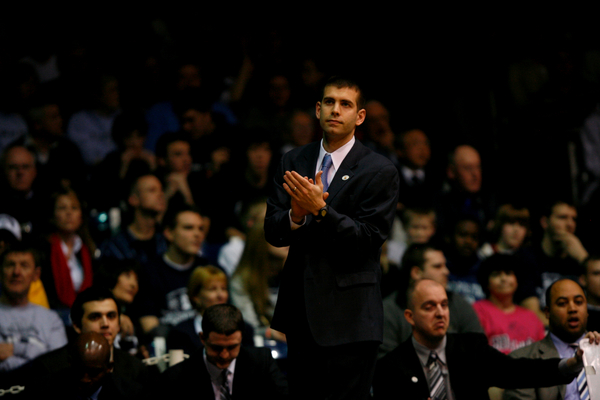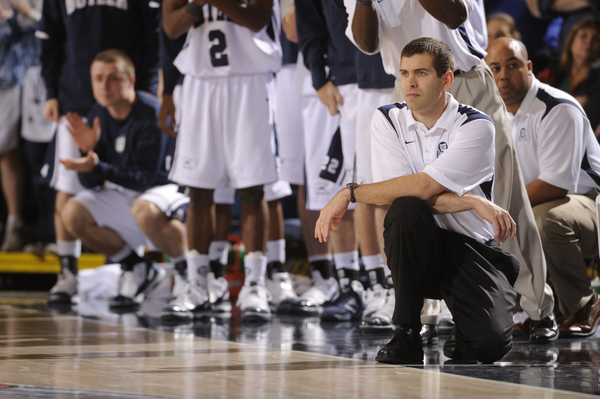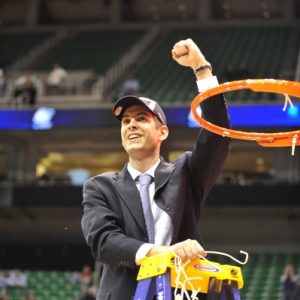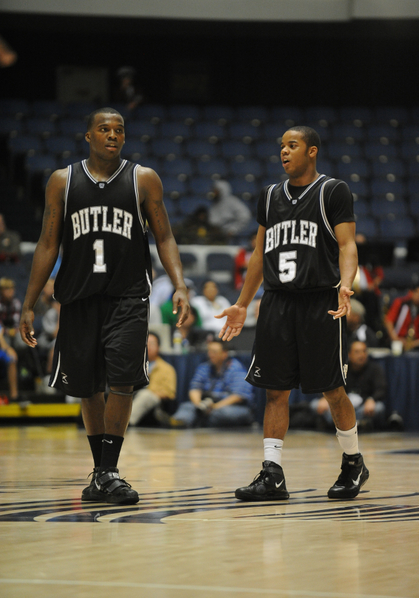The RTC Interview Series: One On One With Brad Stevens
Posted by jstevrtc on September 10th, 2010
Rush The Court is back with another edition of One on One: An Interview Series, which we hope to publish weekly on Friday mornings throughout the year. If you have any specific interview requests or want us to interview you, shoot us an email at rushthecourt@yahoo.com.
It used to be that the first thing that people thought when they saw Butler head coach Brad Stevens was something along the lines of, “He’s a head coach? How old is he?” That changed on April 5th. By saying things changed for him after the title-game loss to Duke, we’re not saying that Stevens looks any older. We’re saying that now people will think of him primarily as one of the best coaches in our game instead of just a young-looking basketball coach, though Stevens would be the first to deflect such praise. When you talk with Brad Stevens (whose three teams have produced three perfect academic ratings, by the way), you are immediately aware of what seems to be an innate professionalism, and the fact that this man is much more comfortable talking about his team than himself, making sure that any incoming credit goes to everyone, not just him. Most of all, though, you recognize his absolutely inflexible belief in the abstract concept known as The Butler Way, that it’s, in fact, the best way for him to grow as a coach and for his players to function as the best team possible. RTC’s John Stevens (no relation) spoke with Coach Stevens earlier this week.
Rush The Court: Coach, as the current guardian of it, in your own words, what is “The Butler Way?”
Brad Stevens: You know, I don’t think it has anything to do with basketball, technically, first of all. I think it’s just about embracing a culture of (hopefully) unselfishness and accountability, and that doing the right things will lead to the results you ultimately want from a statistical and measurable standpoint. The definition we have online is probably the best it gets. Right when you go to ButlerSports.com, it pops up. But that’s the bottom line. If you’re going to define it, that’s as good as it gets. I think it’s a really hard thing to define, and it’s more about feeling and seeing that you’re moving in a positive direction.

After Only Three Seasons as Head Coach at Butler, In Our Opinion Stevens Is Already Part of the Coaching Elite.
RTC: Last year was in so many ways a dream season, and even though you didn’t quite achieve the ultimate goal for which you set out, it was obviously a phenomenal run. Was there any particular aspect of your squad’s play that showed up as the year progressed that even you hadn’t expected, something that pleasantly surprised even you, as coach?
BS: No particular individual did, and not really from a team standpoint, either, from how we were playing. I think from a results standpoint the thing that stood out to me, the thing I thought was the best accomplishment of the year was going undefeated in the league. I’ve never been a part of that and never dreamed that I would be, and I know how hard it is to do. You know, like everybody else, I’m listening to talk shows and everybody’s talking about Boise State’s schedule and everything else, and I’ve been in those shoes from the standpoint of…boy, the pressure that they play with in their league AND the fact that, everybody they’re playing against, that’s their super bowl. You can’t quantify that. That should add points to their strength of schedule. So I think that that’s something I’ll look back at fondly from last year. Obviously you’re excited about the run to the final game. But is it better to beat five really good teams that don’t know much about you, or is it better to beat every team on your league schedule twice, teams that know you inside and out? For me, it was the latter.
RTC: The Horizon League seems to be adding better recruits each season, players who are then developed over several years by their coaches; it seems the quality of that particular conference has improved each year over the past few…
BS: I think that’s the case. I agree with you that it’s getting better, but at the same time I think it’s been really good all along. When we do what we’ve done in the tournament, and when other teams win games here or there I think that always helps the perception [of the conference].
RTC: How long did it take you to get over the championship game, the Duke game?
BS: I’ll never get over it! I don’t know if I’ll ever get over that, I wish I could. I think obviously that you always move on, but it’s a hard pill to swallow.

Stevens' Bulldogs Held Their First Five NCAA Tourney Opponents (Including Syracuse, Kansas State, and Michigan State) to Under 60 Points. Duke Scored 61.
RTC: I remember that the Sports Science guys broke it down and found that, looking at where it hit the backboard, the last shot by Gordon Hayward would have gone in but for a mere 2.5 inches. I assumed you’d still be seeing that shot in your sleep.
BS: (Laughs) There’s no doubt, I see it in my sleep. But, that’s part of it. We were so fortunate to be there in a lot of ways.
RTC: After last season, your name was linked with a few other head coaching jobs that opened up — namely Oregon, Wake Forest, and Clemson. How close were you to pulling the trigger and taking one of them?
BS: Yeah…no. Never crossed my mind. Never even considered it. I was flattered to be in those discussions, but I never even considered it.
RTC: You’ve stated on several occasions that it’s not about the money, or power, or whatever, but what would it take? Is there anything at all that another college or even a professional team could put on the table that would intrigue you?
BS: I honestly can’t imagine having a better job than I have.
RTC: Butler doesn’t really have a history of snagging or even efforting the big four- or five-star recruits you see on these high school recruiting lists — the Top 100s and 150s and what-not — with which college basketball fans, coaches, and even players themselves are sometimes obsessed. While there’s certainly no reason to change what you’re doing, given the level of success you’ve achieved at Butler, it’s understandable that after last season you’d have a lot of these big time recruits more interested in your program than ever. After last year’s great run, did you take any different approach to recruiting this year?
BS: I think what we need to do is get people who we think are Top 100 guys when their high school careers are over. That’s been our focus, and it’s got to continue to be our focus. One of the things is, you know, these rankings are very subjective. There are a lot of good basketball players out there, and there’s a lot that goes into guys becoming good basketball players once they get into college. So what we need to do is figure out the best fits for Butler, and find and continue to recruit those guys. One of the things I really believe in is that it’s important to “tweak that change,” to get guys to want to spend time thinking about how to get better. I think we’ve got a really good thing and a really unique thing, and I think that’s something that’s been validated, to me, time and again. Over the last few months, I’ve been asked a ton about, “What are you going to change? How do you want to be different?” I think we’ve been pretty good the way we are, but I think we do need to get better, we all need to be striving for improvement in every area, finding what makes us better, but I like the way that we go about recruiting.

Stevens has many more clipped nets in his future. He says he'll "never get over" last year's final against Duke, but we bet the nets from a title game would help.
RTC: A couple of quotes of yours from last year rank among my favorite basketball quotes ever. The first was from an interview with SI last year when you commented on a key aspect in your philosophy of the game, specifically underscoring the concept of “valuing the basketball.” You said, “Win the next possession. That’s our focus. It’s boring. It’s also the way championships are won.” The second came during last year’s tournament, when you said, “There are no mid-majors in this tournament, just a bunch of guys playing basketball.” With what you’ve built, though, we can now ask this: in addition to your own philosophy on the game, what coaches have you taken the most from, or learned from? Or was there ever a conscious effort to follow an exterior model, like Mark Few at Gonzaga or someone else at a similarly-sized school?
BS: First of all, John, I want to say that there are a lot of really good people in college basketball. Sometimes the easy thing is to focus on things that aren’t going well in our game, and sensationalize the problems, magnify the problems. What I’ve learned is that there are a lot of great basketball coaches and a lot of great people, and they’ll go out of their way to help this great game get better. So, the people who I’ve tried to learn from, obviously I’ve leaned on Todd Lickliter, I’ve leaned on Thad Matta, definitely leaned on Barry Collier — he’s my boss now, my AD…
RTC: All of those, Butler men, former Butler head coaches…
BS: Right. And beyond that Butler family, you’re always learning from your opponents. As you’re breaking down film…you know, I don’t think there’s a team that I’ve watched in the last four years that I haven’t taken something from. As a coach, maybe you’re putting in a new play with your team, you’ll call it or refer to it by the name of that other team, you know? The one you took it from. You’ll say, “Remember when we guarded it this way? Remember this action?” Then you’ll use it against another team and refer back to it like that. Like I said, you’re always striving to get that little bit better, so you’re always taking things from your opponents. But outside of that, to me, coaching is…well, the Xs and Os are really important, and I’m going to spend a lot of time on them. But it’s a lot less about that, and a lot more about managing people, at the end of the day.
RTC: Let’s look forward, now. You’ve got so many important cogs from last year’s team returning for the upcoming season. One of the things you’re famous for is the development of players, bringing along guys you’ve already got on the squad so they get better and therefore play more each season. You’ve brought in some exciting new faces for this season, and already for 2011. But your program has a somewhat new challenge this year. This season, you’ll be mentioned in some pre-season top fives, top ten at the absolute worst, and I’ve even heard one major media personality say you could be as high as #2 to start the year. Another tournament run or even a Final Four is almost expected. How will you and your guys handle that? One one hand, you want to acknowledge what you and your predecessors and former players have built at Butler, but you also don’t want your players getting complacent because of that highest-ever pre-season ranking.
BS: We were ranked as high as 10th in the pre-season last year, so I guess in a lot of ways, we’ve already lived it. I didn’t think we’d earned that high a ranking, the 10th ranking, in the pre-season last year. I thought we’d won a few close games the year before, sneaked out a few wins that could have gone either way, and ended up in the tournament, then just barely got beat in the first round [71-75 to #9 LSU in a South Region 8-vs-9 game], so I didn’t feel like that was a team that had earned a top ten ranking in the next pre-season. Now, we felt like we could get there, and ultimately we did, I guess. But the one-and-done tournament makes it so that the best two teams don’t have to play for the championship, it’s the teams that play the best on their way through, the ones playing the best at that time. Certainly, on any given night I felt like we could play with anybody in the country, and I think that’s what you want to feel like going in [the NCAA Tournament]. But as far as the rankings go, I’ve always felt this: you get past the one-seeds, and everybody else is about the same. There’s a little difference here and a little difference there, but there’s so much parity between, you know, #5 and #50, or #10 and #50. We don’t pay a lot of attention to it, though I’m sure our guys will read about it. I’ll read about it, and we’ll all hear about it, but I think last year’s experience should help us handle some of that. We’re not going to look at anybody any differently, anyways, whether we’re not ranked at all or we’re ranked really highly.
RTC: In the past, you’ve made mention of how you place great importance on statistical analysis when preparing for an opponent, even noting that you spend as much time concentrating on statistical breakdowns as you do looking at game film. As you know, we’re not a statistics site, but we consider ourselves big stat nerds around here. What’s your systematic approach to breaking down an opponent’s statistical profile? Is there a specific statistic you find the most telling or revealing about a team’s tendencies, or is it more of a general search for trends and/or weak points?
BS: (After laughing at my “stat-nerd” self-characterization) It’s trends and tendencies. You feel really good about your ability to analyze a stat sheet if you can then go validate it on the game film afterwards. I think it’s a good litmus test of how good your understanding is of the team you’re playing against.
RTC: Your players have definitely bought into it. I remember [rising junior guard] Ronald Nored quoted in the New York Times last year, talking about how you and your staff break down stats to the point that you guys know the opponent’s tendencies better than they know them themselves, or something like that, and that he thought Butler was always the most prepared team in the country because of the whole statistical analysis you and your staff employ.
BS: Yeah, I think that’s a nice thing to say about our coaches and preparation, I think our assistant coaches do a great job, but at the end of the day, that…that one part [laughs]…it’s not true. You know yourself better than anybody else. But it is nice that he’d say that. But I think that feeling prepared is a good thing, and we have to know we’ve prepared well to be successful, especially against the best of the best.
RTC: Where do you get your data, aside from what your staff brings to you? Do you use any of the various stats-based sites like KenPom or Basketball State?
BS: Anywhere. We’ll take them from anywhere. Anywhere we can find them. I think all that’s very good, the ones you mention, but it’s also about going back and trending teams throughout the course of the season, through all of their game stats.
RTC: You’ve only been a head coach for three years, but I remember something John Wooden said about you after you’d made the Final Four. He said that he enjoyed watching you and “very much” enjoyed your style of play, and that it “looked different” than most other teams these days. How great was THAT to hear, and especially now that we’ve unfortunately lost the great man?
BS: We were fortunate that a lot of people said a lot of nice things about us, but that’s…that’s got to rank right at the top. That’s something that means a lot to me, to our team, to our staff, and to Butler. To be recognized by a person of that caliber and for him to say that is certainly a great honor, no doubt about it.
RTC: Coach, we were fortunate enough to attend several Butler games last season, and when went to the Final Four, we spent some time talking to people on the Butler campus a few hours before the championship game. I think it’s one of the best things we’ve ever had on the site, and I don’t think we could have been treated any better, or encountered a nicer collection of people. Thanks for taking the time to talk today, and we wish you and your team a great season and a healthy one.
BS: I appreciate the well-wishes, John, and if that’s the impression you came away with, you know, with the people you talked to and everything, it sounds like you certainly got a great idea of what makes Butler so special. It’s such a wonderful place.











































